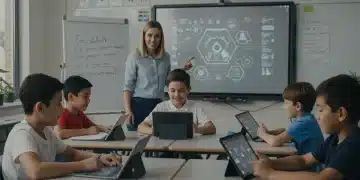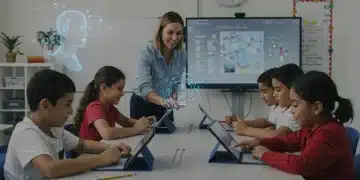Teacher professional development grants increased: What to know

Teacher professional development grants provide essential funding for educators to enhance their skills and improve teaching quality, leading to better student outcomes and innovative classroom projects.
Teacher professional development grants increased provide vital resources for educators seeking to improve their skills. Have you wondered how these grants can shape the classroom experience? Let’s dive into their significance and explore what you can gain from them.
Understanding teacher professional development grants
Understanding teacher professional development grants is essential for educators looking to enhance their skills and improve their teaching methods. These financial resources can help teachers access training and workshops that foster their growth. But what exactly are these grants, and how do they work?
Types of teacher professional development grants
Grants can vary widely in purpose and funding sources. Some focus on specific subjects or teaching methods, while others support general professional development. Here are a few common types:
- Federal grants
- State-level funding
- Private foundation grants
- Local education agency initiatives
Many teachers may feel intimidated by the grant process. However, it can be a straightforward task once you know what to look for. Many schools provide resources to help teachers navigate the application process. Seeking out workshops or informational sessions can also boost your confidence.
Benefits of obtaining a grant
Securing a teacher professional development grant can lead to numerous benefits. These advantages can significantly impact both teachers and their students:
- Access to high-quality training programs
- Networking with other educators
- Improvement in student outcomes
- Enhancements in personal teaching practices
Once educators receive these grants, they can invest in workshops that align with their specific needs. For instance, a math teacher may attend a seminar on innovative teaching strategies, while a science instructor might explore new technology in their field. The possibilities are expansive, allowing teachers to tailor their professional journey.
It’s important to keep in mind that these grants often require a commitment. Teachers must actively engage in the professional development activities outlined in their applications. This dedication not only helps them grow but ultimately benefits their students, leading to a more enriching learning environment.
By understanding the ins and outs of teacher professional development grants, educators can unlock new opportunities for growth. These grants are not just financial support; they represent an investment in a teacher’s future and the future of their students.
How grants impact teaching quality

Understanding how grants positively influence teaching quality is crucial for educators and school administrators. These funds help equip teachers with the tools and resources needed to enhance their classroom practices.
Enhancing Access to Resources
One of the primary ways grants impact teaching is by providing access to educational resources that might otherwise be unavailable. When schools receive funding, they can purchase:
- New learning materials
- Technology tools
- Specialized training programs
- Additional staff support
These resources can dramatically improve the learning environment for students. With better tools, teachers can create engaging lessons that meet diverse student needs.
Professional Development Opportunities
Grants often fund professional development opportunities, enabling teachers to improve their skills. Ongoing training helps educators stay current with teaching trends. This continuous learning makes them more effective in the classroom.
When teachers participate in training sessions, they explore innovative teaching methods and effective classroom management techniques. Implementing these strategies can lead to increased student engagement and success.
Moreover, collaboration among teachers in grant-funded programs fosters a supportive community. Educators exchange ideas, share best practices, and provide feedback to each other. This network enhances overall teaching quality.
Finally, grants encourage schools to implement data-driven approaches. By analyzing student performance data, educators can identify areas needing improvement. Addressing these areas leads to targeted instruction, benefiting all learners.
The application process for grants
The application process for grants can seem daunting, but a clear understanding of the steps involved makes it manageable. Breaking down the process helps educators navigate successfully through the requirements.
Researching Available Grants
First, researching the different types of grants available is crucial. Many organizations offer funding for teacher professional development. Some helpful resources include:
- Federal and state education websites
- Local educational agencies
- Nonprofit organizations focused on education
- Grants databases
Each grant may have specific eligibility requirements, so it’s essential to read the guidelines carefully before proceeding.
Preparing Your Proposal
Writing a compelling proposal is the next step. A strong proposal typically includes:
- A clear statement of purpose
- Detailed project objectives
- A budget outline
- Expected outcomes and benefits
It’s crucial to demonstrate how the grant will enhance teaching quality or student learning. Be specific about the resources needed and how they will make a difference in the classroom. Clarity and coherence are key to making a strong impression.
In addition to the written proposal, many grants may require supplementary materials. This may include letters of support from school administrators or stakeholders. Collecting these documents early helps streamline the process.
After submitting the application, be prepared for follow-up communication. Some organizations may ask for more details or a presentation about your proposal. Being responsive and providing any requested information promptly is essential to strengthen your case.
Success stories: Effective grant usage

Success stories of effective grant usage showcase how funding can transform classrooms and improve student learning outcomes. Many educators have harnessed these grants to implement innovative projects that engage their students and enhance educational experiences.
Innovative Classroom Projects
For instance, one school district received a grant to establish a coding program for middle school students. As a result, students learned valuable skills in programming and problem-solving. This initiative not only sparked interest in technology but also prepared students for future careers in STEM fields.
Similarly, another educator utilized grant funding to create a reading garden, a vibrant outdoor space where students can read and explore literature. The garden brought students together, fostering a love for reading and outdoor learning.
Professional Development Opportunities
Some success stories involve teachers using grants for professional development. One teacher attended a workshop on differentiated instruction, learning how to better meet the diverse needs of her students. Upon returning, she implemented new strategies that significantly boosted student engagement and achievement.
Another group of teachers collaborated on a grant to attend a national conference, where they shared methods and learned from experts. Bringing this knowledge back to their school led to improved teaching practices and a stronger educational community.
These examples illustrate how grants enable teachers to think outside the box and implement effective educational strategies. They empower educators to explore new methods and create more dynamic learning environments for their students.
FAQ – Frequently Asked Questions about Teacher Professional Development Grants
What are teacher professional development grants?
These are funds provided to educators to enhance their skills and improve instructional practices.
How can I apply for a grant?
You can apply by researching available grants, preparing a solid proposal, and submitting your application according to the provided guidelines.
What can grant funds be used for?
Funds can be used for training, resources, technology, or innovative projects that enhance teaching and learning.
Can I receive multiple grants?
Yes, educators can apply for and receive multiple grants as long as they meet the eligibility requirements for each.





